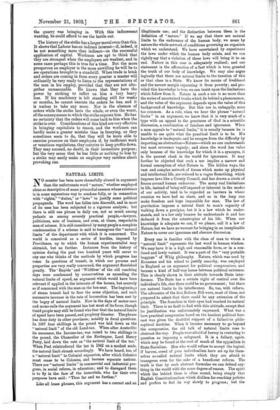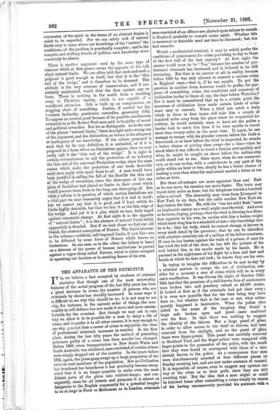NATURAL LIMITS.
NO counter has been more shamefully abused in argument than the unfortunate word "nature," whether employed alone as descriptive of some primordial essence whose existence is in some mysterious way to condone folly, or in connection with "rights," "duties," or " laws " to justify some political propaganda. The word has fallen into discredit, and in most of its uses has been subjected to a rigorous analysis ; but there is still one phrase in daily use, not so much among pedants as among severely practical people,—lawyers, politicians, men of business, and even, at times, respectable men of science. It is still considered by many people a complete condemnation if a scheme is said to transgress the "natural limits" of the department with which it is concerned. The world is conceived as a series of hurdles, imposed by Providence, up to which the human experimentalist may skirmish, but no further. Instances from the history of opinion during the past two hundred years will occur to any one who thinks of the methods by which progress has come. In questions of transit, in which our persons and properties are very really concerned, the argument flourished greatly. The 'Rapids' and 'Wildfires' of the old coaching days were condemned by conservatives as exceeding the natural limits of speed, an argument which would have been relevant if applied in the interests of the horses, but scarcely so if concerned with the man on the box-seat. The beginnings of steam transit had to face the same objection, and each successive increase in the rate of locomotion has been met by the bogey of natural limits. Now in the days of motor-cars and mono-rails the argument has lost most of its force, though timid people may still be found who fear that the natural limits of speed have been passed, and prophesy disaster. The phrase has done duty in other provinces; notably in fiscal questions. In 1697 four shillings in the pound was laid down as the "natural limit" of the old Land-tax. When after Austerlitz its successor, the Income-tax, was raised to two shillings in the pound, the Chancellor of the Exchequer, Lord Henry Petty, laid down the rate as "the natural limit of the tam." When Peel reintroduced the tax in 1842 on a modest scale, the natural limit shrank accordingly. We have heard, too, of a "natural limit" to Colonial expansion, after which Colonies must cease to be Colonies, and become separate nations. There are "natural limits" in commercial and industrial pro- gress, in social reform, in education ; and to disregard them is to fly in the face of the immortals, who for their own purposes have said : "Thus far and no further."
Like all loose phrases, this argument has a correct and an
illegitimate use ; and the distinction between them is the definition of "nature." If we say that there are natural
limits to the endurance of the human body, we mean by nature the whole network of conditions governing an organism which we understand. We have ascertained by experiment the laws under which the human body exists, and we can rightly say that a violation of these laws will bring it to an end. Nature in this case is adequately realised; and our statement is the affirmation of a fact which is true, granted the truth of our body of knowledge. We may also argue logically that there are natural limits to the taxation of this or that class in a State. We know its means of livelihood and the narrow margin separating it from poverty ; and pro- vided this knowledge is true, we can insist upon the limitations which follow from it. Nature in such a use is no more than the series of ascertained truths which lie behind a phenomenon, and the value of the argument depends upon the value of this background of knowledge. But this use is, unhappily, none too common. As a rule, when we hear the phrase "natural limits" in an argument, we know that it is very much of a type with an appeal to the greatness of God in a scientific discussion, a combination of fatalism and ignorance. When a man appeals to "natural limits," it is usually because he is unable to see quite what the practical limit is to be. His knowledge is inadequate, and he escapes from the difficulty by importing an abstraction—Nature—which no one understands but most reverence vaguely ; and since the word has value only because of the knowledge for which it is a synonym, it is the poorest cloak in the world for ignorance. It may further be objected that such a use implies a narrow and formal conception of what Nature is. The hidden ways, the vast and complex network of forces which make up physical and intellectual life, are reduced to a vague Something, which imposes laws like a County Council, and has drawn a circle of fences around human endeavour. The many real limitations in life, instead of being self-imposed or inherent in the modes of our activity, tend to be regarded as barriers in whose creation we have had no share, and so in the long run make freedom and hope impossible for man. The law of gravitation imposes a natural limit to man's capacity of walking down a precipice, but it is a law which he under- stands, and is a law only because be understands it and has deduced it from the catastrophes of his life. When our knowledge is adequate we can, if we please, call it a law of Nature, but we have no warrant for bringing in an inexplicable Nature to cover our ignorance and obscure discussion.
Every one is familiar with the class of man to whom a "natural limit" represents the last word in human wisdom. We may have it in a high and reasonable form, or in a con- fused and lowly variant. It was a part of the" very portable baggage" of Whig philosophy. Nature, which was used by Rousseau and his school to justify anarchy, was employed in England as an argument for political compromises, and became a kind of half-way house between political extremes. This is clearly shown in their attitude towards State inter- ference. The State has a certain right of control over the individual's life, else there could be no government ; but there are natural limits to its interference. So, too, with reform. The advocates of the first Reform Bill were, most of them, not prepared to admit that there could be any extension of the principle. The franchise in their eyes had reached its natural limit. There is no fault to find with this attitude, except that its justification was unfortunately expressed. What was a bare practical compromise based on the hastiest political fore- cast was given the doubtful support of a fallacicus philo- sophical doctrine. When it became necessary to go beyond the compromise, the old talk of natural limits rose to obstruct the way. People were afraid of heresy in venturing to question so imposing a safeguard. It is a fallacy, again, which may be found at the root of much of the opposition to State Socialism. Men who would refuse to accept the logical, if barren, creed of pure individualism have set up for them- selves so-called natural limits which they are afraid to transgress even for the sake of a beneficent reform. The truth is that by such abstract formulae we can defend any- thing in the world with the same degree of reason. The spirit which lies behind them is often sound, being simply that English Constitutionalism which dislikes far-reaching policies and prefers to feel its way slowly to progress; but the expression of the spirit in the terms of an abstract dogma is much to be regretted. For we can safely talk of natural
only in cases where our knowledge of the 'nature," the no-nditions, of the problem is practically complete; =din the complex and shifting details of politics such knowledge must commonly be absent.
There is another argument used by the same type of reasoner which at first glance seems the opposite of the talk about natural limits. We are often told that such-and-such a pr4osal is good enough in itself, but that it is the "thin end of the .wedge," and is therefore to be shunned. This attitude is the very extreme of conservatism, and if con- sistently Maintained, would shut the door against any re- form. There is nothing in the world, from a standing army, to 'Christian charity; which is not capable of 4 maleficent eitension. Life is built up on compromises, on stopping short of something. Justice, if carried too far, becomes. -barbarity, gentleness cowardice, generosity folly. TO "Oppose an avowed good because of its possible mischievous extension is, as Sir Robert Peel once said, to be guilty of moral and .political cowardice. But let us distinguish. AS in the ease of the phrase "natural limits," there is a right and a wrong use of the al:gun:lent, and the distinction, as before, is the adequacy or. inadequacy of our knowledge. If the reform proposed is such that by its very definition it is unlimited, or if it is prepesed in a form where no limitations appear, then we may justly 'call .it the" thin end of the wedge." It is right in certain. circuinetaiaces, to call the protection of an industry the thin mid of the universal Proteetion wedge, since the same causes which make the protection of one trade desirable must soon apply with equal force to all A man would have been justified in calling the fall of the Bastille the thin end or the wedge of revolution, since the destroyers of this one piece of feudalism had placed no limits to their creed which would prevent them from in the long run destroying all. But when a reform is in question of which certain limitations are a vital Part we may reasonably argue that it is bad in itself; but we Cannot say that it is good, and if kept within its liOiits highly desirable, but that we fear it as the thin edge of the wedge. And yet it is a plea which we hear daily urged against reasonable change. At first sight it is the opposite of :" natural limits " ; it is the absence of natural limits which apparently is dreaded. But if we look closer we find our old friend, the abstract conception of Nature. The limits inherent in the scheme—artificial, self-imposed limits, if you like—are to be defeated by some fordo of Nature which knows no limitations. In one case, as in the other, the fallacy is based on a distrust of the power of human institutions to prevail against a vague thing called Nature, which is either occupied iximpsetting our barriers or in erecting fences of its own.



























































 Previous page
Previous page